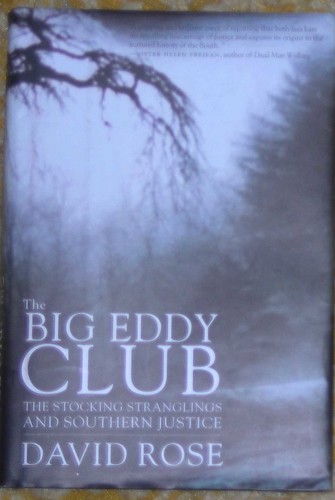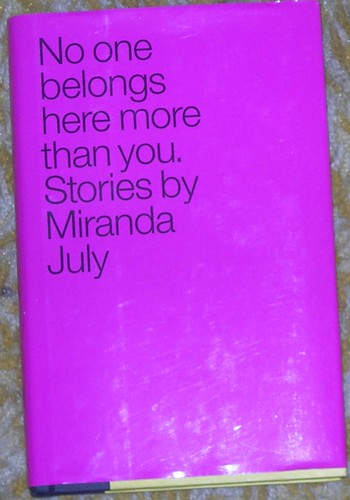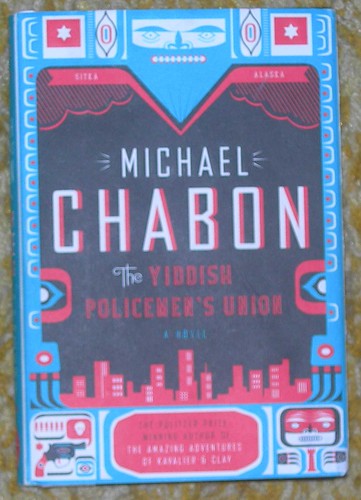350pp
Read: 05/29/07 - 06/23/07
Nonfiction! Gasp!
Why the hell do I sometimes choose to read as "pleasure reading" books that are tangentially or directly related to my daily concerns? I know that it makes sense, that I'm going to read about those topics that interest me, and this will be informed by my day-to-day life. But reading this book, I sometimes felt that I was compounding my real-world frustrations by reading about real people coping with some of the very same frustrations. Suffice to say, if you're trying to get a job in public defense in Georgia, and are finding that the state would rather not pay for such jobs, you'd really rather not read a book largely about a Georgia court's unwillingness to provide necessary funds for an indigent defendant facing the death penalty.
The book is "about" the Stocking Stranglings, a series of rape/murders down in Columbus, and the eventual legal struggle of Carlton Gary, the man convicted of those crimes. I had a deuce of a time finding this book, as it was filed under "True Crime." Which is an accurate enough label--"True Criminal Procedure" would be more apt--but located it among one of the bookstore's less reputable shelves.
So this book was out of place. Rose is a Vanity Fair writer experienced in covering criminal matters; his wife happens to be Oxford's Criminology reader. His writing style reminds me of Charlie Kaufman's line in Adaptation: "big, sprawling New Yorker crap." Rose has an incessant need to contextualize. In order to tell us about this murder trial, he must tell us about the American criminal justice system, its peculiarities in the South, and a hundred years of race-relations in Columbus, GA. This approach has its advantages; Gary's experience quickly becomes emblematic of larger issues of race and justice. But Rose's structure is a little unnerving, too. Time in this book moves not like an arrow through space, but like an inexpertly-wielded sewing needle. First we are told of Rose's first trip to Columbus, then of Columbus's earliest history, then of the crimes in the late 70s, then of Reconstruction, then the trial, which leads to an account of Gary's life, and then Rose himself enters the picture, and we follow his own investigations. To be fair, I found this least frustrating when I read larger chunks in a stretch.

You begin this book fully expecting it to end with Gary's exoneration. You, the reader, are aware that Rose is writing in 2006, describing a 1984 trial, and you figure that his account will take you through direct appeal, state & federal habeas claims, and then, in the legal-thriller movie-style dramatic ending that really does happen in criminal law, Gary's conviction would be overturned. You become especially certain of this when reading about the trial, with its shaky junk science and judicially-crippled defense team; surely, you think, in the space of twenty years some higher court will have seen the injustice here. And I bet that's what Rose's editor thought. I imagine they had Rose committed to a book five years ago, and were sure of a dramatic, and possibly highly publicized final outcome in the case by now. Instead, Rose takes you up to 2006, and announces that, as of that writing, Gary was awaiting an evidentiary hearing in the Middle District of Georgia. This is of course mildly disappointing, but the next few pages are gripping, actually. Turning from Gary's case, Rose denounces the Rehnquist Court's disengagement from criminal procedure, and laments Herbert Packer's utoptian "Due Process Model of Criminal Justice." And believe you me, whenever a dude named "Rose" starts talking about Herbert Packer, I am riveted.
Finally, Rose includes an epilogue to gloss over that last appeal, and then inform you that you can follow the ongoing legal wranglings of Carlton Gary, wrongfully convicted black man, on his publisher's website. So, in 2007 it seems we have seen the emergence of a new cop-out of an ending: "To be continued...on teh blogz!!!" (Which happens to be how Harry Potter ends, as well as the Michael Bay Transformers movie.)


